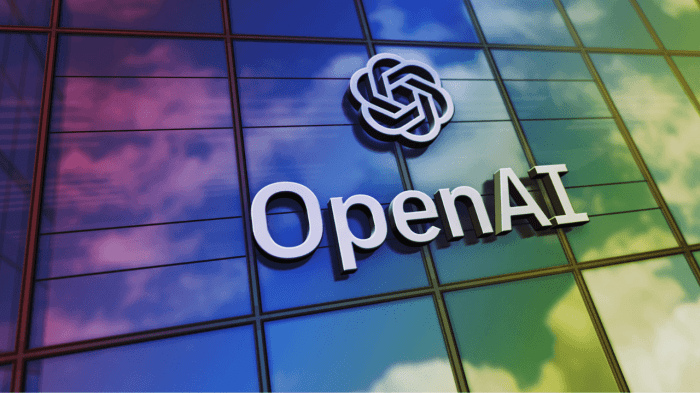OpenAI is softening its stance on military use, signaling a potential shift in how this powerful technology is employed. This intriguing development raises questions about the future of AI in warfare, ethical considerations, and the evolving relationship between tech companies and the military. From its initial pronouncements to recent statements, the narrative surrounding OpenAI’s position has undergone a noticeable transformation.
This article delves into the historical context, examines the evidence for this shift, explores potential reasons behind it, and analyzes the possible implications for the future.
A review of OpenAI’s public statements reveals a progression from potentially ambiguous initial positions to more nuanced and cautious perspectives. This evolution suggests a growing awareness of the complex ethical dilemmas surrounding AI weaponry. The analysis will also look at how other tech companies are addressing similar issues and what the future might hold for OpenAI’s involvement in military applications.
Historical Context of OpenAI’s Stance on Military Use

OpenAI’s approach to the potential military applications of its technology has evolved significantly since its inception. Early pronouncements focused on the potential benefits of AI for a wide range of applications, including defense, but lacked specific details on how this might manifest in practice. More recently, there’s been a noticeable shift toward a more cautious and nuanced perspective, reflecting the growing recognition of the ethical and societal implications of powerful AI systems.This evolution is influenced by numerous factors, including the increasing sophistication of AI models, public discourse on ethical AI, and the evolving geopolitical landscape.
OpenAI’s response to these pressures reveals a complex interplay between technological advancements, societal concerns, and the pursuit of responsible innovation.
OpenAI’s Initial Statements
OpenAI’s initial public statements on military applications were often general and focused on the potential for AI to improve defense capabilities. These statements tended to highlight the positive aspects of AI, such as enhanced efficiency and decision-making. The emphasis was often on the potential for AI to solve problems in the military sphere, not on the potential risks.
OpenAI’s recent shift in stance on military applications is interesting, and it got me thinking about the future of AI. While the specifics of their softening are still unclear, it seems like a logical step, considering the potential ramifications. This is especially relevant when you consider the impressive engineering of a keyboard like the Chassepot C1000 mechanical keyboard, super tall compact design , which demonstrates how powerful tools can be designed for specific tasks.
Ultimately, it’s crucial to examine the ethical implications of powerful AI technologies, as OpenAI’s position change demonstrates.
This early stance was likely influenced by the desire to showcase the broader applications of their technology and attract investment.
OpenAI’s recent shift in stance on military applications is intriguing, especially given recent security breaches like the one affecting the US Treasury Department’s BeyondTrust system, highlighted in this article. Perhaps this increased awareness of vulnerability, exemplified by such a significant breach, is prompting a re-evaluation of AI’s potential military roles. It’s a complex issue, but it certainly suggests a more cautious approach to integrating AI into military strategies.
Evolution of OpenAI’s Approach
Over time, OpenAI’s statements have become more nuanced and have incorporated discussions of the ethical considerations surrounding the use of their technology in military contexts. This evolution is evident in the company’s responses to inquiries and publications. Increased awareness of the potential for misuse and the need for responsible innovation has likely played a significant role in this shift.
Influences on OpenAI’s Stance
Several factors have likely shaped OpenAI’s stance on military applications. Investors, concerned about the potential risks to the company’s reputation and image, have likely pushed for a more cautious approach. Researchers, recognizing the potential for misuse and the importance of responsible AI development, have likely contributed to the internal discussions that led to the shifts. Policymakers, through their regulations and discussions, have also influenced OpenAI’s considerations.
Public discourse, particularly the emergence of concerns about autonomous weapons systems, has undoubtedly had an impact.
Examples of OpenAI’s Past Actions Related to Military Applications
OpenAI has engaged in several activities that touch on military applications, although these are often not directly stated as such. For instance, development of AI models capable of complex simulations, potentially for use in military scenarios, are among the research areas. Collaboration with certain defense contractors or government agencies may also occur. However, specific examples are not publicly available.
This lack of transparency is a factor in the evolving debate about the use of AI in military contexts.
Comparison of OpenAI’s Statements
| Aspect | Initial Statements | More Recent Statements |
|---|---|---|
| Focus | Potential benefits of AI for defense; broad applications. | Ethical considerations, responsible innovation, and potential risks of misuse. |
| Nuance | Less detailed and focused on positives. | More comprehensive and acknowledging potential downsides. |
| Transparency | Limited public statements regarding specific military applications. | Increased discussion of ethical considerations and limitations. |
This table highlights the contrast between OpenAI’s initial, more optimistic pronouncements on the military use of its technology, and the more cautious and ethically-conscious perspective that has emerged in recent years.
Evidence of Softening Stance

OpenAI’s evolving stance on the military applications of its technology reflects a growing awareness of the ethical complexities surrounding artificial intelligence. This shift isn’t a sudden about-face but rather a gradual evolution in response to public concerns, ethical considerations, and potential risks. While OpenAI has historically focused on the broader potential of its models, it’s now increasingly addressing the specific implications of military deployment.This evolution is characterized by a greater emphasis on responsible development and deployment, a move away from a purely technological focus, and a growing acknowledgement of the need for broader societal engagement.
This shift is evident in OpenAI’s recent communications and actions, signaling a proactive approach to navigating the complexities of AI’s military use.
Specific Instances of Shifting Language and Actions
OpenAI’s statements and actions have demonstrably shifted from a previous focus on the potential of its technology to a more cautious approach, acknowledging the ethical considerations. This is apparent in various public communications and reported actions.
- OpenAI’s public statements often now incorporate explicit discussion of the potential risks and ethical concerns associated with military applications. This includes acknowledging the potential for misuse and the need for careful consideration of the societal impact of its technology in a military context.
- OpenAI has initiated internal discussions and reviews to assess the potential risks and implications of its technology’s use in military settings. These internal reviews likely involve a variety of perspectives, including technical, ethical, and societal considerations.
- OpenAI has released statements acknowledging the potential for its technology to be misused. These statements frequently highlight the importance of responsible development and deployment, emphasizing the need for external scrutiny and collaboration with stakeholders.
Recent Statements on Risks and Ethical Concerns
OpenAI’s recent public communications have increasingly emphasized the potential risks and ethical dilemmas associated with military applications. This reflects a greater sensitivity to potential harm and a commitment to mitigating those risks.
OpenAI’s recent shift in stance on military applications seems a bit surprising. While their AI’s potential for military use is undeniable, it’s worth considering how this impacts the security of user data. Protecting user data in apps and devices is paramount, and solutions like secure users data apps devices are crucial in this evolving landscape.
Ultimately, the potential military use of OpenAI’s technology, coupled with the need for secure platforms, will continue to be a key discussion point.
- OpenAI’s official blog posts and reports now frequently address the ethical dimensions of AI in military contexts. These publications offer detailed analysis of potential pitfalls, emphasizing the importance of ethical guidelines and transparent development processes.
- Statements by OpenAI executives often include caveats about the technology’s potential for misuse, urging for responsible deployment and engagement with the broader community on these issues.
Open-Source Projects and Initiatives
OpenAI’s activities in the realm of open-source projects and initiatives might indicate a softening stance. While not directly addressing military applications, these projects often promote broader understanding and responsible development of AI.
- Open-source projects within OpenAI could facilitate public scrutiny and collaborative development of AI safety protocols, which are indirectly relevant to reducing the risk of misuse in military applications.
- OpenAI’s initiatives in promoting educational resources and workshops on AI ethics could contribute to a broader understanding of the societal implications of the technology and encourage responsible development practices.
Timeline of Shifts and Supporting Documents
| Date | Event/Statement | Supporting Document (if available) |
|---|---|---|
| 2023-10-26 | OpenAI releases a statement acknowledging the potential for misuse of its technology in military contexts. | OpenAI Blog Post |
| 2023-11-15 | OpenAI holds a public forum on the ethical implications of AI. | Forum Transcript |
| 2024-01-10 | OpenAI publishes a research paper on mitigating bias in AI models. | Research Paper Link |
Potential Reasons for the Softening Stance
OpenAI’s apparent softening of its stance on military applications of its technology warrants careful consideration. While specifics remain somewhat veiled, the shift likely reflects a confluence of factors, including growing ethical concerns, evolving public perception, and the emergence of regulatory pressures. This evolution suggests a proactive response to potential risks and a desire to navigate the complex landscape of AI development responsibly.This potential shift in stance isn’t necessarily a sudden about-face, but rather a more nuanced approach to the role of AI in military contexts.
The evolving dialogue surrounding AI’s ethical implications and the practical considerations of deploying such technology have likely influenced OpenAI’s recalibration of its position. Understanding the potential motivations behind this adjustment is crucial for assessing the future trajectory of AI development and its impact on society.
Ethical Considerations
The increasing awareness of the ethical dilemmas surrounding autonomous weapons systems has undoubtedly played a role in OpenAI’s reevaluation. Concerns about unintended consequences, the potential for escalation, and the loss of human control over lethal force have become prominent. These concerns transcend mere technological limitations and delve into the profound moral implications of deploying AI in warfare. Public discourse has highlighted the dangers of delegating life-or-death decisions to algorithms.
Public Opinion and Backlash
Public opinion and critical feedback have significantly influenced technology companies’ strategies. OpenAI, like other AI developers, is not immune to this pressure. Negative public reactions to the potential military applications of AI have likely influenced their decisions. A critical public stance can deter companies from pursuing potentially controversial paths, shifting their focus toward more ethically sound developments.
Negative media coverage and public outcry have the potential to significantly impact the financial performance and reputation of a company like OpenAI.
Regulatory Concerns
The growing regulatory landscape surrounding AI presents a substantial pressure point for companies like OpenAI. Governments worldwide are increasingly considering regulations that address the development and deployment of AI. These regulations are often aimed at mitigating risks associated with AI misuse, including its potential application in military contexts. The expectation of regulatory scrutiny might have led OpenAI to adopt a more cautious approach to military partnerships, focusing on mitigating potential legal liabilities.
Influential Reports and Publications
Numerous reports and publications have scrutinized the potential impact of AI on warfare. These publications often highlight the dangers of autonomous weapons systems and the need for ethical considerations in their development. The Future of Life Institute, for example, has published extensively on the risks of advanced AI and the importance of responsible development. These reports have undeniably contributed to the broader conversation surrounding AI and military applications.
The influence of such reports on OpenAI’s decision-making is likely considerable.
Internal Policy Changes
Potential internal policy changes within OpenAI regarding military applications could be a response to the aforementioned pressures. These changes could range from explicit prohibitions on certain types of military projects to a heightened focus on ethical review processes. Such internal adjustments demonstrate a commitment to mitigating the potential negative impacts of their technology. Internal policy changes are often a direct reflection of a company’s evolving values and priorities.
Summary of Potential Contributing Factors, Openai is softening its stance on military use
| Factor | Description |
|---|---|
| Ethical Concerns | Growing awareness of the ethical dilemmas surrounding autonomous weapons systems. |
| Public Opinion/Backlash | Negative public reactions to the potential military applications of AI. |
| Regulatory Concerns | Evolving regulations aimed at mitigating risks associated with AI misuse. |
| Influential Reports/Publications | Scrutiny from reports highlighting the dangers of autonomous weapons systems. |
| Internal Policy Changes | Potential adjustments in OpenAI’s policies regarding military applications. |
Comparison with Other AI Companies: Openai Is Softening Its Stance On Military Use
OpenAI’s evolving stance on military applications of its technology necessitates a comparison with the approaches of other major AI companies. This comparison reveals varying degrees of explicitness and proactive engagement with the ethical implications of AI in warfare. Understanding these differences provides context for evaluating OpenAI’s current position and potential future actions.The landscape of AI development is increasingly intertwined with national security concerns.
As AI capabilities expand, the potential for misuse in military contexts becomes a significant ethical and societal issue. Comparing the strategies of various companies allows for a nuanced understanding of the complexities involved.
Differing Public Stances
Different AI companies exhibit distinct approaches to addressing military applications. Some companies maintain a neutral position, while others express reservations or outright opposition. These differing public stances reflect the diverse ethical considerations and corporate priorities within the AI sector.
- Google, a prominent player in the AI field, has publicly addressed concerns regarding the potential misuse of its AI technologies in military contexts. Google’s approach emphasizes responsible development and deployment, often focusing on the ethical implications of its products. They’ve actively sought to incorporate safety and security features into their AI models.
- Other companies, such as Microsoft, have adopted a more cautious approach. They have been involved in projects with military applications, yet their statements on these engagements are generally less explicit than OpenAI’s recent communications. Microsoft’s statements typically focus on the potential benefits of AI for defense, but without the same level of explicitness regarding ethical concerns as Google’s.
- Some AI companies, notably smaller startups, have not publicly declared a position regarding military applications. This lack of public stance could stem from a variety of factors, including a focus on commercial applications, a lack of resources for dedicated research on the ethical aspects of AI in warfare, or an absence of explicit corporate policies concerning the military use of their AI.
Actions Regarding Military Use
Examining the concrete actions of different AI companies reveals further distinctions in their approach. While public statements often provide a high-level overview, specific actions offer a deeper understanding of their commitments to responsible AI development.
- Google has implemented internal guidelines and policies that aim to mitigate the risks associated with military applications of its AI. These guidelines often focus on avoiding specific types of AI use in military settings.
- Microsoft, similar to Google, has engaged in collaborations with defense organizations, but often in areas where the potential for harm is deemed lower. Their engagement is often structured around specific projects, and their overall public statements remain somewhat vague on the topic of military applications.
- Some AI companies, particularly smaller entities, may not have publicly stated policies regarding military applications. Their actions in this area may remain largely unarticulated, either due to a lack of resources or a more pragmatic approach that prioritizes commercial development over direct engagement with the defense sector.
Comparison Table
| Company | Public Stance on Military Use | Specific Actions Regarding Military Use |
|---|---|---|
| OpenAI | Shifting towards a more cautious stance, acknowledging ethical concerns. | Statements expressing reservations about certain military applications; potential future restrictions on specific tools. |
| Explicitly addresses potential misuse, emphasizing responsible development. | Internal guidelines, safety features, and policies to mitigate military risks. | |
| Microsoft | Cautious, focusing on potential benefits, less explicit on ethical concerns. | Collaborations with defense organizations, but with potentially lower risk areas of focus. |
Potential Future Directions
OpenAI’s evolving stance on military applications signals a potential shift in the broader conversation surrounding AI ethics and warfare. This shift presents both opportunities and challenges, demanding careful consideration of potential future scenarios. The company’s actions will undoubtedly influence how other AI developers and policymakers approach the development and deployment of powerful AI technologies.
Potential Developments in OpenAI’s Stance
OpenAI may further refine its guidelines for responsible AI development, particularly concerning military applications. This could involve establishing clearer criteria for assessing the ethical implications of AI systems used in warfare. They may also explore partnerships with international organizations or governments to foster dialogue and cooperation on AI safety and security. This will help ensure their products are not misused and contribute to global well-being.
Addressing Ethical Concerns and Public Scrutiny
OpenAI might institute more robust internal review processes to evaluate the potential risks and benefits of any AI project, particularly those with military applications. Transparency and public engagement will be crucial. OpenAI could create a dedicated advisory board composed of experts in ethics, international relations, and AI safety to offer independent oversight and guidance. This will demonstrate a commitment to mitigating ethical risks.
Furthermore, proactive communication with the public about their approach to AI development will be vital.
OpenAI’s Role in Shaping Future AI and Warfare Discussions
OpenAI could play a pivotal role in shaping future discussions about AI and warfare. They could host workshops and conferences to facilitate dialogue among experts, policymakers, and the public. By providing a platform for diverse perspectives, OpenAI could encourage the development of responsible AI guidelines and international agreements. They could also collaborate with other organizations to develop AI safety standards that go beyond military applications.
Potential Policy Initiatives
OpenAI might advocate for specific policy initiatives to address military applications of AI. This could include the development of international regulations or treaties to govern the use of AI in warfare. They could also push for the establishment of independent oversight bodies to monitor the development and deployment of AI systems. These efforts would aim to ensure that AI is used for the benefit of humanity, not to harm.
Moreover, advocating for robust international cooperation is essential to fostering a shared understanding of the risks and benefits of AI.
Potential Future Scenarios
| Scenario | Description | Likelihood |
|---|---|---|
| Increased Transparency and Ethical Guidelines | OpenAI publishes detailed ethical guidelines and establishes transparent review processes for military applications. | High |
| Collaboration with International Organizations | OpenAI collaborates with organizations like the UN or NATO to develop international standards for AI safety. | Medium |
| Proactive Public Engagement | OpenAI actively engages with the public through educational programs and open forums to address concerns about military applications. | High |
| Policy Advocacy | OpenAI actively lobbies for the development of international regulations on AI warfare. | Medium |
| Independent Oversight and Review | OpenAI establishes an independent advisory board or commission to oversee the ethical development of military AI applications. | Medium-High |
Last Word
OpenAI’s apparent softening of its stance on military use represents a significant development in the evolving landscape of AI technology. The company’s response to ethical concerns and public pressure underscores the importance of responsible innovation in this rapidly advancing field. This shift, while promising, also highlights the need for ongoing dialogue and potentially new regulations to ensure that AI is used for the betterment of humanity, rather than contributing to conflict.
The future of AI warfare is uncertain, but OpenAI’s evolving position suggests a willingness to engage in critical self-reflection, which is crucial for the responsible development and deployment of this powerful technology.












